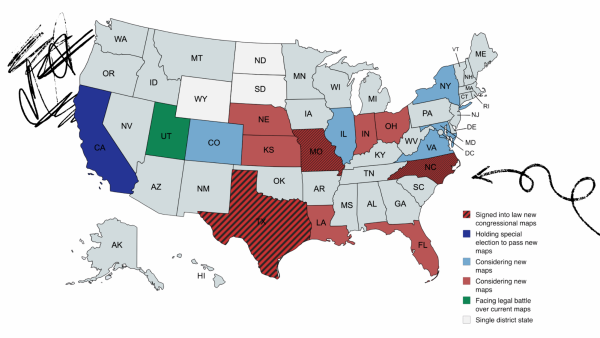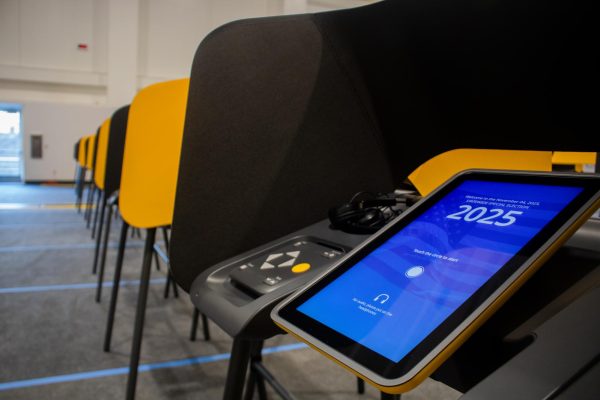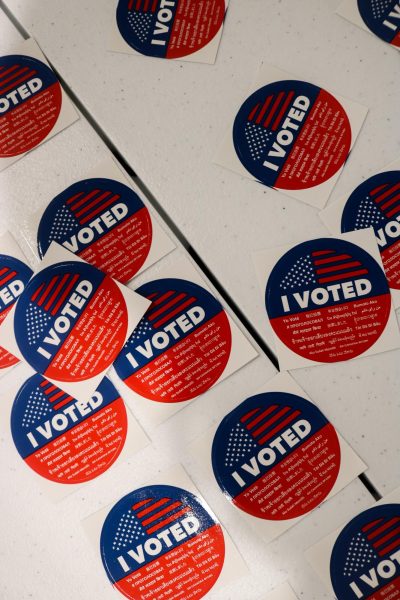Prop. 50 raises broader questions about ethics and power
Alexandra Macias, a political science professor at CSUN, has long upheld the California Citizens Redistricting Commission (CRC) when lecturing in her classes. The commission, whose creation was authorized in 2008, was established to ensure fairness and bipartisanship in California districting.
For Macias, this commission has served as a model of good government for the rest of the country. However, despite it being highly regarded nationally and winning the Harvard Innovation in Government Award in 2017, residents of the Golden State are now being asked to vote to temporarily dismantle the group’s work with Proposition 50.
“The way that Californians can see having an attempt to influence national politics is by increasing the amount of representation that might be opposed to the president,” Macias said.
A special election to be held on Nov. 4 will decide the authorization of mid-redistricting to gerrymander the Democrats’ way into five additional House seats. Governor Gavin Newsom proposed the measure after Texas announced plans to redraw its own districts to gain five additional Republican seats, with Missouri and North Carolina following suit.

These new California maps would only be valid until 2030 in an effort to preserve the CRC, according to Democrats.
There are arguments both for and against Proposition 50 in the state of California, and at the center of the conflict sits an ethical dilemma – should Democrats compromise their morals and play Texas’ game?
CSUN Professor of Philosophy Jorge Muñoz said yes.
“If in the 2026 elections, we have a shift to the Democratic Party, then you will have checks and balances,” Muñoz said. “That will undermine and make Donald Trump … what we call a lame duck president.”
According to Muñoz, Californians are facing a “prima facie” rule in which the need to maintain checks and balances within government outweighs the moral obligation to uphold bipartisan districting.
“It’s a very fine line, and I think we have to be very careful when we play this type of ethical political game,” Muñoz said.
Muñoz challenges the argument that California’s participation in gerrymandering is unethical.
In Texas, North Carolina and Missouri, redistricting maps were drawn by Republican lawmakers without a vote by the people. Inversely, Newsom held a special election for citizens to decide whether or not they approved of new lines being drawn.

“They’re allowing this to be a referendum that the citizens can vote on,” Muñoz said. “So in that sense, it’s at least semi-democratic.”
Muñoz believes the Trump administration poses the most dangerous attack on U.S. democracy since the Civil War. He points to attempts to control universities through President Donald Trump’s Higher Education Compact and the compliance of the House and the Supreme Court as examples of this threat.
He added that the growing divide between the two major political parties has further weakened this system.
“They’re both retaliating at each other,” Muñoz said. “The redistricting is just another form of retaliation.”
While the U.S. is, in the simplest terms, a democratic country, there are factors of its government that are not set up democratically, according to Kristina Meshelski, a CSUN professor of philosophy.
The Senate is an example of representation imbalances between states. Wyoming, a predominantly red state with a population of approximately 587,618 people, is represented by two senators. California, a blue state with a population of approximately 39.43 million people, receives the same number of representatives.
“There’s obviously, like, a greater representation for people who live in less populous states within the American system,” Meshelski said. “So, I think when we’re evaluating how we draw our districts, we want to always keep in mind, like, the big picture, right?”
That “big picture,” according to Meshelski, is what kind of representation Californians seek to have nationally. Proposition 50 could allow the state an opportunity to gain larger representation within the House.

Having a voice and advocating for the rights of her generation is what CSUN student Andrea Muñoz is all about.
Muñoz, a junior and kinesiology major, researched Proposition 50 after her mom brought up the subject. They both found the news surrounding the proposition to be confusing, and sat down together to do their own research.
“From my perspective, the way Congress and our entire administration’s working right now, I don’t think it’s focusing on the youth side,” Muñoz said.
In her research lab on campus, Muñoz said she and her classmates always strive to stay informed. Muñoz also fears for the future of physical therapy and other medical professions and believes voting for Proposition 50 is a way to push back against the administration’s policies.
Back in Macias’s political science classrooms, Macias said that though this special election is for the state of California, it is a national issue as states across the country redraw their own maps. According to her, this is truly an opportunity for students who choose to vote to make an impact on a national scale.
“That would be something that I think would be extra important for students to remember,” Macias said. “It’s a direct democracy, a direct democratic election. They really can have an effect on the outcome of this particular issue.”
CSUN’s voting center is located in Room 180 at Redwood Hall, adjacent to the Matador Soccer Field. The center is open from 7 a.m. to 8 p.m. for early voting until Nov. 3, as well as on Election Day during the same hours.
Latest Daily Sundial
- LAPD shuts down rowdy Dodger celebrationsThousands of fans across Los Angeles took over streets to celebrate the Dodgers’ World Series title win on Nov. 1. Fans flooded intersections in downtown LA, Echo Park and Pacoima...
- CSUN’s costumed jazz band hits The MintInside The Mint in Los Angeles, surrounded by roughly stroked paintings and colored lighting, CSUN Jazz performed on Oct. 24. This was far from the venue’s first show, as they...
- Research programs face grant terminations due to anti-DEI ordersThe CSUN Office of Undergraduate Research (OUR) has taken significant hits in grant terminations following an executive order from President Donald Trump. The action called for the dismantling of all...
- Bracelets and bonds at Mental Health MondayAt CSUN’s Plaza Del Sol, the Associated Students host Mental Health Mondays, an event promoting connection and well-being. Students come together to make friendship bracelets, share conversations, and build community....
- Matadors halted by Mustangs in five setsAfter forcing a fifth set, the women’s volleyball team couldn’t answer back to a very competitive Cal Poly team who won Saturday night’s match 3-2 at the Premier America Credit...
- OcTUBAfest opens ears to tuba musicA wave of deep brass tones echoed through the Shigemi Matsumoto Recital Hall on Saturday, Oct. 26, as Dr. P. Blake Cooper lifted his tuba and kicked off this year’s...






